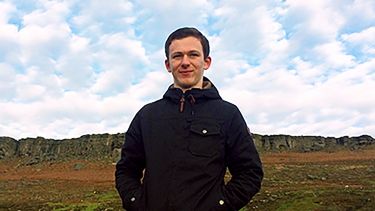The Foundation Year was very useful and provided a great introduction to university life

What drew you to apply and accept a place on the Foundation Year (FY)?
Originally when choosing my A-level options I aspired to go into the world of economics - however, after a work experience placement at Rolls-Royce and speaking to various friends and family who work within the industry, I decided that the engineering profession was more suited towards my strengths and goals.
Unfortunately, I had already decided on my A-level choices and was lacking in certain areas of the Maths and was also without the required Physics. Luckily, I was made aware of the Foundation Year at the University of 91̽»¨, which provided a clear route into the world of engineering for me.
How did FY help to prepare you for Year 1 study and beyond?
As well as providing me with the technical knowledge to start my degree, the Foundation Year gave me the opportunity to complete both a group project and an individual project on topics of my choice.
These allowed me to see how presentations and essays were done and assessed at university for the first time, and it gave me a big advantage going into Year 1 of my degree.
The group project allowed me to develop my team-working skills, which is an important strength to have when undertaking any university course.
What were the big learning points for you during your FY?
During the Foundation Year, a lot of content is covered over a relatively short period of time, which can be tough initially, but with the help of the lecturers you soon get used to it and learn how to work effectively. I felt the benefits of having overcome this challenge during my first year, where right from the beginning I have been able to manage my workload.
Another thing that the Foundation Year incorporates into the curriculum is university-level laboratory work on a weekly basis - this can be challenging, but it is very rewarding.
It also means that by the time you are in the first year of your course, you will already be knowledgeable about the correct practices in real engineering environments, a skill that not many other students will have.
One of the biggest challenges for me was learning to cope with the increased responsibility for my own education
William MacDonald-Lowe
MEng Civil and Structural Engineering
What do you enjoy most about your current degree programme?
The Foundation Year was very useful and provided a great introduction to university life, but what I am really enjoying now I am on to my first year of Civil Engineering is that almost all of my work is highly related to the real world of engineering.
One module has even allowed me to produce a design of a real building in 91̽»¨ on modelling software.
Even though the work gets harder as you progress, the increasing ability to relate what is being looked at to real life problems, for me, makes it easier to engage with the work and means that I have more fun doing it.
What are your favourite things about studying in 91̽»¨?
Coming from a small town myself, the relatively small size of 91̽»¨ particularly appealed to me; almost everything is within a short walk or cycle ride, and you’re never too far from the hills!
Despite not being a huge city, there is a huge range of things to get involved in for people of any interest, both in and out of the university, so it feels like you’re getting the best of both worlds.
How have you overcome challenges so far and what would be your advice to a prospective Foundation Year student?
One of the biggest challenges for me was learning to cope with the increased responsibility for my own education.
Unlike at school, if you aren’t turning up, staying on top of your work, and completing set tasks, nobody will be there to force you back on track so you will have a responsibility to manage your time, and the balance between work and leisure can be something that some people take some time getting used to.
My biggest piece of advice would be the same as you’ll have been hearing throughout school: don’t leave everything until the last minute.
This is particularly relevant at university, where new deadlines can come up unexpectedly, and you don’t want to be rushing a piece of work that will affect your end-of-year result!
What are your career aspirations after your degree?
After I graduate, I hope to be able to work on civil engineering projects that will benefit others.
I would particularly like to work abroad in the future, and this could involve working in developing countries. Given that throughout a civil engineering course so many different topics are covered, I am hoping to find a specific area of engineering that especially interests me and that I would like to specialise in.
Due to the nature of the Foundation Year, I have already spent time working with people of different backgrounds and nationalities, which I believe will benefit me if I get the opportunity to work abroad in my career.

